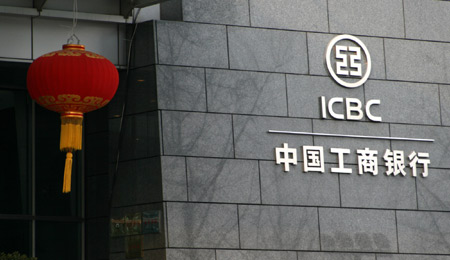Top Biz News
ICBC to curb property loans
By Wang Bo (China Daily)
Updated: 2010-02-09 09:04
 |
Large Medium Small |
|

|
|
The Industrial and Commercial Bank of China vows it will not issue new loans to developers who seek to speculate on rising property prices through "hoarding land" or "putting off home sales" and may also call back earlier credit to such borrowers. [China Daily]?? |
Stricter regulations will be applied to stem rising credit risks
The Industrial and Commercial Bank of China (ICBC) said yesterday it would apply stricter approval rules to property lending this year as part of an effort to balance its loan structure and stem rising credit risks.
The world's largest bank by market capitalization will not issue new loans to developers who seek to speculate on rising property prices through "hoarding land" or "putting off home sales" and may also call back earlier credit to such borrowers, the lender said at its 2010 work conference.
"We will not finance property projects or developers with inadequate capital reserves," it added.
The remarks followed repeated government calls to cool down the country's overheated property market at the beginning of this year, after housing prices in 70 major Chinese cities surged 7.8 percent year-on-year in December, the fastest pace in 2009.
In the face of mounting concerns over inflation and asset bubbles, the central government has tightened monetary policy, including the 0.5 basis point lift in the lenders' reserve requirement ratio in January, to reduce the scale of lending since the beginning of this year.
Record credit expansion last year effectively helped bolster China's economic growth, which recovered to 8.7 percent for the whole of 2009, but it also ignited the ensuing property market boom late last year.
Liu Mingkang, chairman of the China Banking Regulatory Commission, said last month that the regulator would increase its supervision of property lending and urged Chinese banks to closely watch new developments in the real estate market.
"Every Chinese bank has set an upper limit for lending to the real estate sector in recent years, but the limit will be lowered this year as lenders become more prudent and selective in offering loans to developers," said Fu Lichun, a banking analyst at Southwest Securities. Property loans usually account for one fifth of banks' total new lending annually.
But Fu said he believed banks would not reduce property lending significantly because they must maintain a good relationship with developers in order to get more mortgage loan business, a profit-making sector for commercial banks.
"There is not much risk of default in property loans within the next one or two years as an asset bubble burst is not an imminent threat," he said.
Banking regulators aimed to limit new loans to 7.5 trillion yuan this year, 25 percent less than the nearly 10 trillion yuan banks gave out last year. As a result, banks are being urged to advance loans at a reasonable pace and avoid front-loaded and excessive loans at the beginning of the year.
"We will maintain a reasonable and balanced pace of lending this year and make sure we satisfy real market demand," the bank said in a statement after the annual conference yesterday.
The Beijing-based lender advanced some 110 billion yuan in new loans in January, a significant slowdown from the amount it issued a year ago.













